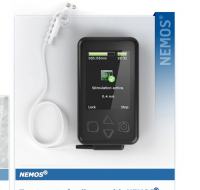Stimulating the vagus nerve like Microtransponder, the German company Cerbomed developed a transcutaneous device that is approved for drug-resistant epilepsy in Europe. In 2013, Finnish doctors did a pilot study utilizing the device for tinnitus with promising results.
Here's a link to the company's website.
The device is worn in your ear. Here's a picture of it from the company's website:

Having multiple sources for relief--including medical devices like tVNS--may be necessary for people with chronic tinnitus. And personally, I'd prefer less invasive treatment modalities--like tVNS, rTMS, and tRNS--to other alternatives.
Acta Otolaryngol. 2013 Apr;133(4):378-82. doi: 10.3109/00016489.2012.750736. Epub 2012 Dec 13.
Transcutaneous vagus nerve stimulation in tinnitus: a pilot study.
Lehtimäki J1, Hyvärinen P, Ylikoski M, Bergholm M, Mäkelä JP, Aarnisalo A, Pirvola U, Mäkitie A, Ylikoski J.
Author information
Transcutaneous vagus nerve stimulation in tinnitus: a pilot study.
Lehtimäki J1, Hyvärinen P, Ylikoski M, Bergholm M, Mäkelä JP, Aarnisalo A, Pirvola U, Mäkitie A, Ylikoski J.
Author information
- 1Tinnoff Inc, Helsinki, Finland.
Abstract
CONCLUSIONS:
This pilot study shows that transcutaneous vagus nerve stimulation (tVNS), if combined with sound therapy (ST), reduces the severity of tinnitus and tinnitus-associated distress. Our magnetoencephalography (MEG) results show that auditory cortical activation can be modulated by the application of tVNS. Thus, tVNS might offer a new avenue to treat tinnitus and tinnitus-associated distress.
OBJECTIVES:
Recent studies suggest that tinnitus can be improved by tailored ST or by VNS plus ST. Our aims were to study whether tVNS has therapeutic effects on patients with tinnitus and, additionally, if tVNS has effects on acoustically evoked neuronal activity of the auditory cortex.
METHODS:
The clinical efficacy was studied by a short-term tVNS plus ST trial in 10 patients with tinnitus using disease-specific and general well-being questionnaires. tVNS was delivered to the left tragus. The acute effects of tVNS were evaluated in eight patients in the MEG study in which the N1m response was analyzed in terms of source level amplitude and latency in the presence or absence of tVNS.
RESULTS:
The treatment with tVNS plus ST produced improved mood and decreased tinnitus handicap scores, indicating reduced tinnitus severity. The application of tVNS decreased the amplitude of auditory N1m responses in both hemispheres.
Source: http://www.ncbi.nlm.nih.gov/pubmed/23237096
CONCLUSIONS:
This pilot study shows that transcutaneous vagus nerve stimulation (tVNS), if combined with sound therapy (ST), reduces the severity of tinnitus and tinnitus-associated distress. Our magnetoencephalography (MEG) results show that auditory cortical activation can be modulated by the application of tVNS. Thus, tVNS might offer a new avenue to treat tinnitus and tinnitus-associated distress.
OBJECTIVES:
Recent studies suggest that tinnitus can be improved by tailored ST or by VNS plus ST. Our aims were to study whether tVNS has therapeutic effects on patients with tinnitus and, additionally, if tVNS has effects on acoustically evoked neuronal activity of the auditory cortex.
METHODS:
The clinical efficacy was studied by a short-term tVNS plus ST trial in 10 patients with tinnitus using disease-specific and general well-being questionnaires. tVNS was delivered to the left tragus. The acute effects of tVNS were evaluated in eight patients in the MEG study in which the N1m response was analyzed in terms of source level amplitude and latency in the presence or absence of tVNS.
RESULTS:
The treatment with tVNS plus ST produced improved mood and decreased tinnitus handicap scores, indicating reduced tinnitus severity. The application of tVNS decreased the amplitude of auditory N1m responses in both hemispheres.
Source: http://www.ncbi.nlm.nih.gov/pubmed/23237096
Here's a link to the company's website.
The device is worn in your ear. Here's a picture of it from the company's website:

Having multiple sources for relief--including medical devices like tVNS--may be necessary for people with chronic tinnitus. And personally, I'd prefer less invasive treatment modalities--like tVNS, rTMS, and tRNS--to other alternatives.

 Member
Member